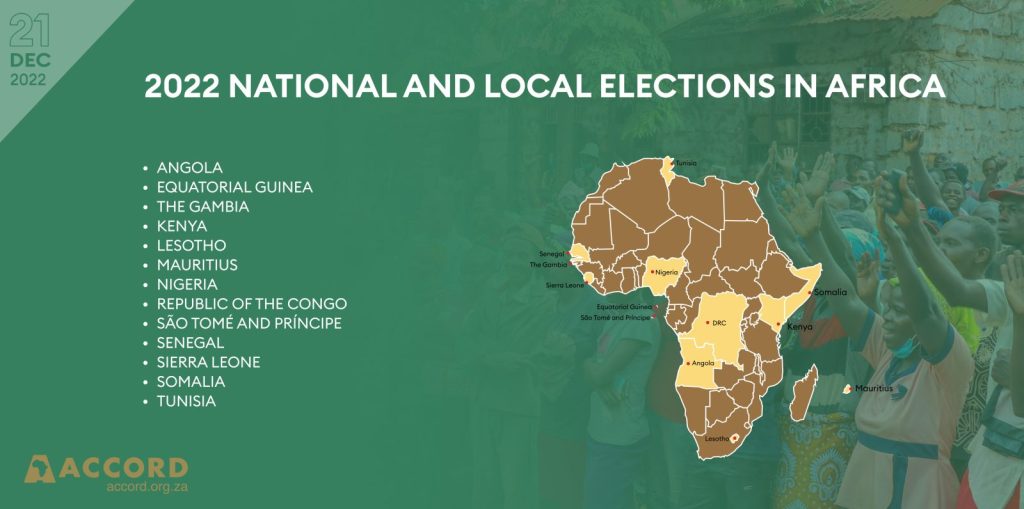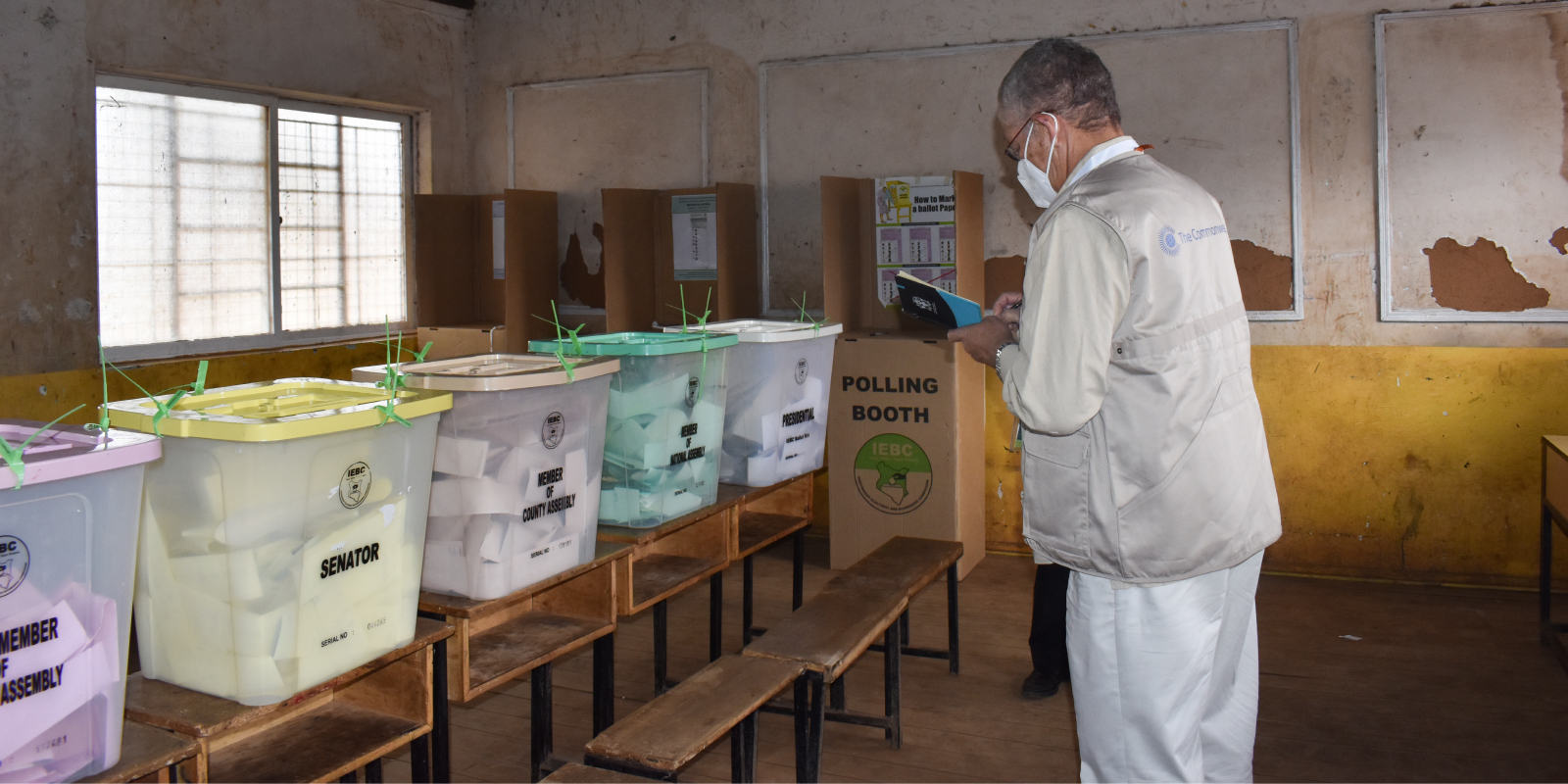Over the last 2 years, much has been written about the recent increase in coups in Africa. West Africa in particular, has been the subject of much analysis and debate on what the possible driving factors are behind this phenomenon. Unconstitutional changes of government (UCGs) remains high up on the agenda of the African Union (AU) and the various Regional Economic Communities (RECs), as they pose a threat to stability and growth on the continent. However, despite the challenges to democracy that UCGs caused some African countries in 2022, the continent has also seen a number of triumphs of the democratic process.
Coalitions can be hard to both establish and maintain. They are also easy to collapse but a successful coalition in Senegal will serve to entrench democracy in the country.
Tweet
Thirteen (13) African countries held elections in Africa this year, with some of the elections taking place in key states in the various regions. In West Africa, Senegal, which took over the presidency of the AU for 2022, held its parliamentary elections in July. Senegal’s electoral system sees 97 of the 165 members of parliament (MPs) elected by the first-past-the-post method, 15 MPs elected by overseas voting and the remaining 53 seats are elected through proportional representation. Senegal, an African country that has never experienced a coup since its independence in 1960, has proven itself to be politically stable, and well capable of consolidating its democracy through holding regular democratic elections.

In 2022, Senegal saw eight coalitions contest elections that had to overcome some obstacles in their build-up. President Macky Sall has refused to publicly state that he will not run for a third term in office in the next elections, raising fears about Senegal’s democratic future. In addition, protests took place in 2021 following the arrest of Ousmane Sonko, one of President Sall’s main political opponents, on charges of rape, a charge he strongly denies. A month before the elections, protests broke out after the primary candidate list of one of the main oppositions, Yewwi Askan Wi (Liberate the People) was disqualified on technical grounds.
Despite these challenges, Senegal held their elections on 31 July, where 46% of voters cast their ballot. President Sall’s Benno Bokk Yakaar (United in Hope) claimed victory, with the head of the presidential coalition claiming they had an “unquestionable majority.” However, this was disputed by opposition coalitions, who said that the ruling party could not make such pronouncements. Nonetheless, the election results were accepted by the coalitions resulting in another successful election for Senegal.
The results of this election have introduced a new phase of politics in Senegal, as for the first time, no coalition has been able to achieve an absolute majority in parliament. The ruling Benno Bokk Yakaar (BBY) lost 42 seats, leaving them with 82 seats in parliament, one seat short of the 83 needed for a majority in the National Assembly. Forming governing coalitions has proven difficult all around the world, with some countries, such as the Netherlands, going months without a government as parties struggled to form governing coalitions. However, BBY were able to form a coalition within two weeks of the elections. The former mayor of Dakar, Pape Diop, whose coalition only received one seat agreed to form a coalition government with BBY, forming the thinnest of majorities. This is Senegal’s first coalition government, and a test of the maturity of the country’s democracy. Coalitions can be hard to both establish and maintain. They are also easy to collapse but a successful coalition in Senegal will serve to entrench democracy in the country.
The Southern Africa region has a state in a similar position to Senegal. Lesotho’s election, which took place in October, with a hybrid electoral system not too dissimilar to that in Senegal, also failed to produce an absolute majority for any one political party. Unlike Senegal, Lesotho is a state that has experienced a number of coups, with a military that has proven willing to involve itself in politics. As a result, Lesotho has had prolonged engagements with the Southern African Development Community (SADC) in order to produce political reforms that will provide stability to the Kingdom. The reform bills to deal with these issues were not passed by parliament in time before it was dissolved for the elections, resulting in the Prime Minister declaring a state of emergency that would allow parliament to convene to pass the bills. The state of emergency was challenged in the courts, with the courts ruling that the state of emergency was not valid, so the sitting of parliament was not legal and thus the bills passed during the sitting were voided.
The ruling by the court essentially signalled that the reform process had failed, and the elections had to be held with the existing constitution and electoral processes. However, the use of the courts to challenge the process of passing the bills shows a Kingdom that trusts its state institutions, or at the very least the independence of the judiciary, to settle and resolve challenges that people might have. The judicial processes unfolded near to the election date and had the potential to derail the elections. However, on 7 October, Lesotho went ahead with their general elections, which have been accepted as free and fair.
The elections were won by a political newcomer, Sam Matekane and his Revolution for Prosperity (RFP) party which he formed only seven months prior to the elections. Like in Senegal, no party was able to win a majority, and like in Senegal, a governing coalition was formed shortly after the elections, minimising any chances of political instability emanating from the lack of a majority party. This is not the first time that the Kingdom has been governed by a coalition, but the Lesotho’s history with coalitions is a difficult one. However, having passed the hurdle of elections in challenging circumstances, there is optimism that this time around, the governing coalition will bring the political stability that is needed for the Kingdom to prosper.
The elections in Lesotho took place not long after elections in Kenya. Kenya went to the polls at the beginning of August to elect the president, governors, MPs and county assemblies. Kenya is an important actor in East Africa and key to stability in the region. With President Kenyatta coming to the end of his second term, Kenya was set to elect a new president. The position was tightly contested by Raila Odinga, a man who has finished runner-up in three previous presidential elections and William Ruto, the incumbent deputy president. The elections were conducted in a largely peaceful manner, and in an attempt to boost the credibility of the elections, the results were published in a more transparent manner than in previous elections. The public and news outlets were encouraged by the Independent Electoral and Boundaries Commission (IEBC) to add up results of the voting stations themselves, rather than waiting for updates from the electoral commission. The new manner of transmitting the results in record time also came after Odinga challenged the electoral processes following his loss in 2017.
Kenya was able to avoid the violence that the US was not, with Odinga choosing to challenge the results through the courts rather than on the streets
Tweet
However, the IEBC faced challenges in the publishing of the results, as it took the IEBC six days to announce them. The delay in the announcement added to the anticipation and tensions in Kenya, as both candidates were confident of victory. Added to the tensions was the move by four of the seven IECB Commissioners to hold a press conference of their own to denounce the elections and indicate that they did not take ownership of the results that were to be announced by the IEBC Chairperson. An hour later, the IEBC announced that William Ruto had won the elections, which sparked brief unrest in the announcement centre.
The four commissioners who rejected the results said that the elections were conducted in an opaque manner and that the sum total of the results announced for the presidential elections was 100.01% which they claimed undermined the accuracy of the results pronounced. The IEBC rejected the accusations and contended that the four commissioners tried to force a re-run and were betraying their oaths of office by acting in a partial manner. Raila Odinga rejected the outcome of the presidential elections and said he would challenge the result. The rejection of the outcomes of the presidential elections has the potential to spark violence and unrest, and one only needs to look at the storming of the United States Capitol in 2021, by a large group of Donald Trump supporters, some of whom were armed, after the incumbent president rejected the outcomes of the results. However, Kenya was able to avoid the violence that the US was not, with Odinga choosing to challenge the results through the courts rather than on the streets. The outcome was a far more civil challenge to the presidential elections, and like in Lesotho, demonstrated trust in the judiciary and state institutions in Kenya. Ultimately, Kenya’s Supreme Court ruled against Odinga and upheld the election of William Ruto as president-elect of Kenya.
Challenges to holding elections in Africa is often much publicised, as are the spate of UCGs and lack of democratic processes in many countries on the continent. However, African electoral successes do not get the same degree of attention. This year’s elections in Kenya, Lesotho and Senegal provide proof of Africa’s electoral resilience and commitment to democratic processes. With a number of key elections taking place in Africa in 2023, hopefully Africa can build on these successes.
Katharine Bebington is a Programme Officer at ACCORD.


